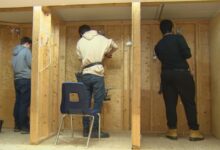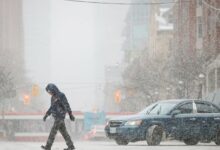High rate of vaccination refusal at 12 Toronto alternative schools creates measles risk, officials say
A dozen Toronto alternative schools have enough students who aren’t vaccinated due to their parents’ personal beliefs to put their schools at risk of a measles outbreak, according to Toronto Public Health.
CBC News analyzed immunization coverage data which shows that 10 per cent or more of students in 12 Toronto District School Board (TDSB) schools have a religious or conscientious exemption to attend public school despite the fact they’re unvaccinated for measles, mumps and rubella.
Alternative elementary and secondary schools are generally smaller than other public schools and use non-traditional, hands-on approaches to Ontario’s education curriculum.
The Toronto Public Health numbers cover all 806 publicly funded schools in Toronto across both the English and French public and Catholic boards for the 2018-2019 school year.
“We want that exemption rate to be lower,” said Dr. Vinita Dubey, Toronto’s associate medical officer of health. “We’ve seen that in California they had exemption rates of 10 per cent or so and that’s what led to large outbreaks of measles in those schools.”
For now those high rates are still the exception in Toronto’s publicly funded schools, with a much lower city-wide rate of 1.7 per cent of students with a religious or conscientious exemption.
But even that Toronto-wide rate is double what it was a dozen years ago, and could lead to large-scale measles outbreaks — like those in the United States this year — if the high rates that are the exception ever become the rule, according to Toronto Public Health.
In a vaccine hesitancy report to Toronto’s Board of Health in September, the city’s chief medical officer recommended that Ontario’s Ministry of Health consider getting rid of non-medical exemptions before “rates reach dangerously high levels” in Toronto.
Federal, provincial and municipal health authorities agree that vaccines are a safe, effective and one of the most important contributors in preventing the spread of infectious diseases like measles.
The highly contagious virus causes coughing, rashes and fever and can lead to serious complications. Last month, the World Health Organization said reported cases rose 300 per cent globally in the first three months of this year compared with same period in 2018 .
Serious reactions to vaccines can occur in about one out of million to one out of 10 million doses administered, according to Toronto Public Health.
20% of Canadian parents hesitate to vaccinate
Despite the position of public health officials, an estimated 20 per cent of Canadian parents are hesitant to vaccinate their kids because they are unsure about the safety and effectiveness of vaccines, according to the city’s report. That hesitancy has been attributed to the proliferation of misinformation about vaccines spread online and on social media.
Across the country, Ontario, New Brunswick and B.C. are the only provinces with legislation mandating certain vaccines for school-aged children — although in all three, parents can get an exemption for their child based on their personal beliefs.
With increasing non-medical exemption rates, Dubey says, schools can lose the protection of herd immunity, where students who are immune to a disease act as a shield for those who aren’t. For measles, 95 per cent of a population needs to be immunized to maintain herd immunity.
“It protects those children in the school who may not be able to get vaccinated, maybe because they’re immune compromised, they’re on chemotherapy drugs, and so they actually can’t receive the vaccine,” Dubey told CBC News.
Some small alternative schools also share their building with a daycare, where some children might not be vaccinated because of their age. Kids don’t receive their measles vaccination until they’re one year old, Dubey says.
‘It was kind of surreal’
One Brantford, Ont., mother knows first hand the danger infants can face before they’re old enough to be vaccinated. Rebecca Stonham’s daughter Scarlett Ronbeck was diagnosed with pertussis, better known as whooping cough, just five days before she was set to be vaccinated in January.
“It was kind of surreal because your mind doesn’t go to a disease like that, that you had thought had been eradicated decades ago,” Stonham told CBC News.
Scarlett was only seven weeks old when she got sick and was intubated at McMaster Children’s Hospital in Hamilton for 10 days. Stonham says they “almost lost her a couple of times,” but Scarlett recovered.
“If you’re putting your child in the school system and they’re not vaccinated, you’re not just affecting your own child,” said Stonham. “You could be affecting many other children as well — which I don’t believe that’s within your rights.”
Across Toronto schools, the highest exemption rate was at da Vinci school, near Russell Street and Spadina Crescent, where 36 per cent, or 17, of of its 47 students have the non-medical exemption. It’s one of seven downtown alternative schools with 10 per cent or more of students unvaccinated for religious or conscientious reasons. The other five are outside the downtown core.
Across the dozen alternative schools 143 of 780 total students have the non-medical vaccine exemption.
In Ontario, certain vaccines are mandatory for all school-aged children under the Immunization of School Pupils Act. However, the act does contain exceptions for medical and non-medical reasons.
Since 2017, parents who don’t want to vaccinate their children for religious or conscientious reasons have to attend an hour-long education session run by public health officials before they are granted an exemption by signing a statement of conscience or religious belief.
Ontario’s legislation is strictest
At the moment that’s the strictest vaccine legislation in Canada. And while Toronto Public Health recommends that it become more restrictive, a handful of Ontario mothers and an anti-vaccine group launched a constitutional challenge last week against the province’s legislation.
Vaccine Choice Canada alleges the law breaches several charter rights, including those to freedom of conscience and religion as well as liberty and security of the person.
“You shouldn’t have to go through hoops to say, ‘No thank you,'” said their lawyer, Rocco Galati. “This is the only thing people think is OK to force medical treatment on people without consent, and it’s unconstitutional.”
In an email, the Ontario Minister of Health’s press secretary told CBC News there are no plans to change the immunization system in the province.
Although New Brunswick and B.C. make vaccines mandatory for school-aged children, neither has mandatory education sessions before granting exemptions for personal beliefs.
After a measles outbreak this spring, New Brunswick’s education minister brought forward a bill to get rid of religious and conscientious exemptions. Public consultations were held in late August. If the bill is passed, the province would become the first in Canada to bar children who aren’t vaccinated due to personal beliefs from attending public schools.
B.C.’s mandatory immunization program only came into effect this fall, after the province had at least 30 confirmed cases of measles this year.
If a case of measles is confirmed in a school, provincial health officials have the authority to keep all unvaccinated children out of school to try and prevent the disease from spreading.
Hesitancy is a global health threat: WHO
Larger-scale measles outbreaks have been on the rise south of the border and around the world.
The United States has had more than 1,200 confirmed cases of measles so far this year, the worst outbreak the country has seen in more than a quarter-century, according to U.S. officials.
Meanwhile, measles in Europe hit a 20-year high in 2018, with 83,000 confirmed cases and 74 deaths, driven by a huge outbreak in Ukraine and clusters in Serbia, France, Italy and Greece.
The spread of misinformation about vaccines on the internet has led the World Health Organization to name vaccine hesitancy among its Top 10 threats to global health this year.
In Toronto, Dubey says Toronto Public Health released the information to be transparent with parents about their children’s school environment.
“I think it’s a really important question for parents to ask,” Dubey told CBC News. “In particular if you have a child who has a weakened immune system … you may make choices about what school you send them to based on vaccination rates.”
CBC








Redes Sociais - Comentários